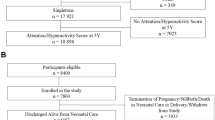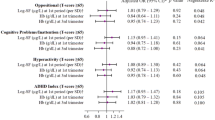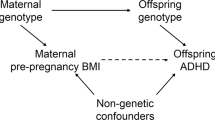Abstract
Objectives:
We examine whether pregnancy weight (pre-pregnancy body mass index (BMI) and/or weight gain) is related to core symptoms of attention deficit hyperactivity disorder (ADHD) in school-age offspring.
Design:
Follow-up of prospective pregnancy cohorts from Sweden, Denmark and Finland within the Nordic Network on ADHD.
Methods:
Maternal pregnancy and delivery data were collected prospectively. Teachers rated inattention and hyperactivity symptoms in offspring. High scores were defined as at least one core symptom rated as ‘severe’ and two as ‘present’ (approximately 10% of children scored in this range). Logistic regression and latent class analyses were used to examine maternal pregnancy weight in relation to children's ADHD core symptoms.
Results:
Teacher rated 12 556 school-aged children. Gestational weight gain outside of the Institute of Medicine guidelines was not related to ADHD symptoms (below recommendations: odds ratio (OR): 0.96; 95% confidence interval (CI): 0.81, 1.14; above recommendations: OR: 0.98; 95% CI: 0.82, 1.16). To examine various patterns of pre-pregnancy BMI and weight gain, we used latent class analysis and found significant associations between classes that included pre-pregnancy overweight or obesity and a high ADHD symptom score in offspring, ORs ranged between 1.37 (95% CI: 1.07, 1.75) and 1.89 (95% CI: 1.13, 3.15) adjusted for gestational age, birth weight, weight gain, pregnancy smoking, maternal age, maternal education, child gender, family structure and cohort country of origin. Children of women who were both overweight and gained a large amount of weight during gestation had a 2-fold risk of ADHD symptoms (OR: 2.10, 95% CI: 1.19, 3.72) compared to normal-weight women.
Conclusions:
We show for the first time that pre-pregnancy BMI is associated with ADHD symptoms in children. Our results are of public health significance if the associations are causal and will then add ADHD symptoms in offspring to the list of deleterious outcomes related to overweight and obesity in the prenatal period.
This is a preview of subscription content, access via your institution
Access options
Subscribe to this journal
Receive 12 print issues and online access
$259.00 per year
only $21.58 per issue
Buy this article
- Purchase on Springer Link
- Instant access to full article PDF
Prices may be subject to local taxes which are calculated during checkout
Similar content being viewed by others
References
Cnattingius S, Lambe M . Trends in smoking and overweight during pregnancy: prevalence, risks of pregnancy complications, and adverse pregnancy outcomes. Semin Perinatol 2002; 26: 286–295.
Catalano PM, Ehrenberg HM . The short- and long-term implications of maternal obesity on the mother and her offspring. BJOG 2006; 113: 1126–1133.
Villamor E, Cnattingius S . Interpregnancy weight change and risk of adverse pregnancy outcomes: a population-based study. Lancet 2006; 368: 1164–1170.
Elysee T, Hille A, van Ouden L, Saigal S, Wolke D, Lambert M et al. Behavioural problems in children who weigh 1000 g or less at birth in four countries. Lancet 2001; 357: 1641–1643.
Mick E, Biederman J, Prince J, Fischer MJ, Faraone SV . Impact of low birth weight on attention-deficit hyperactivity disorder. J Dev Behav Pediatr 2002; 23: 16–22.
Linnet KM, Wisborg K, Agerbo E, Secher N-J, Thomsen PH, Henriksen TB . Gestational age, birthweight and the risk of hyperkinetic disorder. Arch Dis Child 2006; 91: 655–660.
Crawford M, Doyle W, Leaf A, Leighfield M, Ghebremeskel K, Phylactos A . Nutrition and neurodevelopmental disorders. Nutr Health 1993; 9: 81–97.
Georgieff MK . Nutrition and the developing brain: nutrient priorities and measurement. Am J Clin Nutr 2007; 85: 614S–620S.
St Clair D, Xu M, Wang P, Yu Y, Fang Y, Zhang F et al. Rates of adult schizophrenia following prenatal exposure to the Chinese famine of 1959–1961. JAMA 2005; 294: 557–562.
Domali E, Messinis IE . Leptin in pregnancy. J Matern Fetal Neonatal Med 2002; 12: 222–230.
Hay Jr WW, Sparks JW . Placental, fetal, and neonatal carbohydrate metabolism. Clin Obstet Gynecol 1985; 28: 473–485.
Nohr EA, Bech BH, Davies MJ, Frydenberg M, Henriksen TB, Olsen J . Prepregnancy obesity and fetal death: a study within the Danish National Birth Cohort. Obstet Gynecol 2005; 106: 250–259.
Dietz PM, Callaghan WM, Cogswell ME, Morrow B, Ferre C, Schieve LA . Combined effects of prepregnancy body mass index and weight gain during pregnancy on the risk of preterm delivery. Epidemiology 2006; 17: 170–177.
Institute of Medicine Subcommittee on nutritional status and weight gain during pregnancy. Nutrition During Pregnancy, Weight Gain and Nutrient Supplements. National Academy Press: Washington, DC, 1990.
Abrams B, Altman SL, Pickett KE . Pregnancy weight gain: still controversial. Am J Clin Nutr 2000; 71: 1233S–1241S.
Rodriguez A, Järvelin M-R, Obel C, Taanila A, Miettunen J, Irma Moilanen I et al. Do inattention and hyperactivity symptoms equal scholastic impairment? Evidence from three European Cohorts. BMC Public Health 2007.
Delvaux T, Buekens P, Godin I, Boutsen M . Barriers to prenatal care in Europe. Am J Prev Med 2001; 21: 52–59.
Goodman R . The Strengths and Difficulties Questionnaire: a research note. J Child Psychol Psychiatry 1997; 38: 581–586.
Rutter M . A children's behaviour questionnaire for completion by teachers: preliminary findings. J Child Psychol Psychiatry 1967; 8: 1–11.
Goodman R . A modified version of the Rutter parent questionnaire including extra items on children's strengths: a research note. J Child Psychol Psychiatry 1994; 35: 1483–1494.
Goodman R, Ford T, Simmons H, Gatward R, Meltzer H . Using the Strengths and Difficulties Questionnaire (SDQ) to screen for child psychiatric disorders in a community sample. Br J Psychiatr 2000; 177: 534–539.
Muthén LK, Muthén BO . Mplus: Statistical Analysis with Latent Variables—User's Guide, 3rd edn. Muthén & Muthén: Los Angeles, 2005.
Rodriguez A, Bohlin G . Are maternal smoking and stress during pregnancy related to ADHD symptoms in children? J Child Psychol Psychiatry 2005; 46: 246–254.
Young G, Conquer J . Omega-3 fatty acids and neuropsychiatric disorders. Reprod Nutr Dev 2005; 45: 1–28.
American Psychiatric Association. Diagnostic and Statistical Manual of Mental Disorders, 4th edn. Washington, DC, 1994.
Nolan EE, Gadow KD, Sprafkin J . Teacher reports of DSM-IV ADHD, ODD, and CD symptoms in schoolchildren. J Am Acad Child Adolesc Psychiatry 2001; 40: 241–249.
Frazier TW, Youngstrom EA . Evidence-based assessment of attention-deficit/hyperactivity disorder: using multiple sources of information. J Am Acad Child Adolesc Psychiatry 2006; 45: 614–620.
Withagen MIJ, Wallenburg HCS, Steegers EAP, Hop WCJ, Visser W . Morbidity and development in childhood of infants born after temporising treatment of early onset pre-eclampsia. BJOG 2005; 112: 910–914.
Baumeister H, Harter M . Mental disorders in patients with obesity in comparison with healthy probands. Int J Obes 2007; 31: 1155–1164.
Holtkamp K, Konrad K, Muller B, Heussen N, Herpertz S, Herpertz-Dahlmann B et al. Overweight and obesity in children with attention-deficit/hyperactivity disorder. Int J Obes Relat Metab Disord 2004; 28: 685–689.
Lam LT, Yang L . Overweight/obesity and attention deficit and hyperactivity disorder tendency among adolescents in China. Int J Obes 2007; 31: 584–590.
Brookes K, Xu X, Chen W, Zhou K, Neale B, Lowe N et al. The analysis of 51 genes in DSM-IV combined type attention deficit hyperactivity disorder: association signals in DRD4, DAT1 and 16 other genes. Mol Psychiatry 2006; 11: 934–953.
Levitan RD, Masellis M, Lam RW, Muglia P, Basile VS, Jain U et al. Childhood inattention and dysphoria and adult obesity associated with the dopamine D4 receptor gene in overeating women with seasonal affective disorder. Neuropsychopharmacology 2004; 29: 179–186.
Camarena B, Ruvinskis E, Santiago H, Montiel F, Cruz C, Gonzalez-Barranco J et al. Serotonin transporter gene and obese females with impulsivity. Mol Psychiatry 2002; 7: 829–830.
Dallman MF, Pecoraro N, Akana SF, La Fleur SE, Gomez F, Houshyar H et al. Chronic stress and obesity: a new view of ‘comfort food’. Proc Natl Acad Sci USA 2003; 100: 11696–11701.
Van den Bergh BRH, Mulder EJH, Mennes M, Glover V . Antenatal maternal anxiety and stress and the neurobehavioural development of the fetus and child: links and possible mechanisms. A review. Neurosci Biobehav Rev 2005; 29: 237–258.
Pocar P, Brevini TA, Antonini S, Gandolfi F . Cellular and molecular mechanisms mediating the effect of polychlorinated biphenyls on oocyte in vitro maturation. Reprod Toxicol 2006; 22: 242–249.
Neggers YH, Goldenberg RL, Ramey SL, Cliver SP . Maternal prepregnancy body mass index and psychomotor development in children. Acta Obstetr Gynecol Scand 2003; 82: 235–240.
Heikura U, Taanila A, Linna S-L, Hartikainen A-L, von Wendt L, Olsen P et al. Variation in prenatal sociodemographic factors associated with intellectual disability: a study of 20 year interval between two birth cohorts in northern Finland. Am J Epidemiol, 11 September 2007 (in press).
Lee D-H, Jacobs DR, Porta M . Association of serum concentrations of persistent organic pollutants with the prevalence of learning disability and attention deficit disorder. J Epidemiol Community Health 2007; 61: 591–596.
Zhang Y, Proenca R, Maffei M, Barone M, Leopold L, Friedman JM . Positional cloning of the mouse obese gene and its human homologue. Nature 1994; 372: 425–432.
Hendler I, Blackwell SC, Mehta SH, Whitty JE, Russell E, Sorokin Y et al. The levels of leptin, adiponectin, and resistin in normal weight, overweight, and obese pregnant women with and without preeclampsia. Am J Obstet Gynecol 2005; 193 (3, Suppl 1): 979.
Kishi T, Elmquist JK . Body weight is regulated by the brain: a link between feeding and emotion. Mol Psychiatry 2005; 10: 132–146.
Lu XY, Kim CS, Frazer A, Zhang W . Leptin: a potential novel antidepressant. Proc Natl Acad Sci USA 2006; 103: 1593–1598.
Acknowledgements
This research was supported by Nordic Council of Ministers research program on Longitudinal Epidemiology (NordForsk nr. 020056). Cohorts were supported by The Swedish Research Council (345-2004-156); The Academy of Finland (103451), Sigrid Juselius Foundation, Finland; Thule Institute, University of Oulu, Finland and the Danish Medical Research Council. Parts of this paper were presented at the Congress of Epidemiology 2006, Seattle, USA. Study concept, statistical analyses and drafting the manuscript were done by A Rodriguez. J Miettunen supervised and contributed to statistical analyses and data interpretation. M-R Järvelin, TB Henriksen and J Olsen were involved in the study concept, design and data interpretation. Design and execution of the cohorts was done by A Rodriguez (Sweden), J Olsen (Denmark) and M-R Järvelin (Finland). TB Henriksen (Denmark) and I Moilanen (Finland) played important roles in original cohort design. C Obel (Denmark) and A Taanila (Finland) were responsible for cohort data integrity. All authors critically revised the manuscript. The funding sources had no role in study design, data collection, data analysis, data interpretation or writing of the report. The corresponding author had full access to all the data in the study and had final responsibility for the decision to submit for publication.
Author information
Authors and Affiliations
Corresponding author
Additional information
Competing interests
None declared.
Rights and permissions
About this article
Cite this article
Rodriguez, A., Miettunen, J., Henriksen, T. et al. Maternal adiposity prior to pregnancy is associated with ADHD symptoms in offspring: evidence from three prospective pregnancy cohorts. Int J Obes 32, 550–557 (2008). https://doi.org/10.1038/sj.ijo.0803741
Received:
Revised:
Accepted:
Published:
Issue Date:
DOI: https://doi.org/10.1038/sj.ijo.0803741
Keywords
This article is cited by
-
Association of maternal pre-pregnancy body mass index with resilience and prosociality of the offspring aged 6–7 years old: a population-based cohort study in Japan
European Child & Adolescent Psychiatry (2024)
-
Rates of maternal weight gain over the course of pregnancy and offspring risk of neurodevelopmental disorders
BMC Medicine (2023)
-
Maternal weight, gut microbiota, and the association with early childhood behavior: the PREOBE follow-up study
Child and Adolescent Psychiatry and Mental Health (2023)
-
Morbidity and psychomotor development of offspring of women with gestational diabetes: a 5-year follow-up
BMC Pediatrics (2022)
-
Associations between maternal pre-pregnancy body mass index and neonatal neurobehavior in infants born before 30 weeks gestation
Journal of Perinatology (2022)



